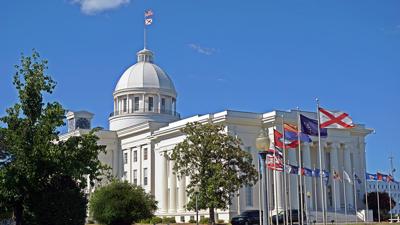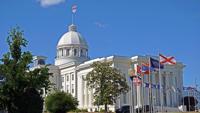MONTGOMERY, Ala. (AP) — Alabama lawmakers return to Montgomery on Tuesday to begin the 2024 legislative session. Here are some issues to watch for as the session begins.
EDUCATION VOUCHERS
Republican Gov. Kay Ivey will back legislation creating education savings accounts, which typically allow parents to claim public money and use it for private school tuition or other qualified expenses. Ivey will unveil her proposal in her State of the State address Tuesday night. “I’m committed to continuing to make it easier for Alabama families to send their children to the best school of their choice,” the governor said last month.
While Ivey has not unveiled the size of her proposal, she said it must be a sustainable program. Legislation introduced last year, that would have given parents $6,900 per child, was criticized by opponents for estimates that it would drain more than $500 million from public education. “We've got to be real cognizant of making wise fiscal choices,” Senate President Pro Tempore Greg Reed said Monday.
GAMBLING
Lottery and casino legislation will again be introduced, but the bill's outlook is unclear. A group of House members have been attempting to negotiate a proposed constitutional amendment to put before voters that would authorize a state lottery and a select number of casino sites.
“I think a lot of folks in Alabama are ready to vote,” House Speaker Nathaniel Ledbetter said of a constitutional amendment. The Republican said the proposal would close illegal gambling operations that have spread across the state.
There has not been a statewide vote on gambling since Gov. Don Siegelman’s proposed lottery failed in 1999. Bills have stalled under a mix of opposition and disputes over who would get casino licenses. Republican Sen. Greg Albritton, who proposed legislation previously, said he thought the number of casino sites would be between six and eight. “If we don't get the gambling bill done this year, it will be another generation before it's approached,” Albritton predicted.
ABSENTEE BALLOT RESTRICTIONS
Republican lawmakers have renewed a push to make it a crime to help non-family members vote by absentee ballot. Republican supporters say the change is needed to combat voter fraud, but opponents have called it an attempt to make it harder for people to vote.
A bill by Republican Sen. Garlan Gudger of Cullman would make it a misdemeanor offense to order, prefill, request, collect or deliver an absentee ballot for someone who is not a household member or close family member. The penalty increases to a felony if the person is paid. The bill provides an exemption for election officials and for people who are blind, disabled or cannot read. The bill will be debated in committee on Wednesday.
ARCHIVES/LIBRARIES
A Senate bill would replace the board that oversees the Alabama Department of Archives and History. The bill by Republican Sen. Chris Elliott would replace the current board with members appointed by the governor, lieutenant governor and legislative leaders. The bill, which will also be in committee Wednesday, comes after Elliott and other lawmakers expressed unhappiness that the department hosted a lecture focused on LGBTQ history. A separate bill would clarify that city and county officials who appoint library board members have the authority to remove a board member at any time.
CRIMINAL JUSTICE
A variety of bills have been filed seeking either to reform Alabama’s criminal justice system or require stiffer penalties for certain offenses. After a kidnapping hoax in Alabama drew international attention, Republican Sen. April Weaver proposed legislation that would make it a felony offense to fake an abduction. Democratic Rep. Chris England of Tuscaloosa has proposed legislation that would allow certain prisoners serving life sentences for robbery and other crimes under Alabama’s stringent habitual offender law to have their sentences reviewed.
OTHER BILLS
The governor and lawmakers are expected to propose a pay raise for state teachers. Republican Sen. Arthur Orr of Decatur said legislation will be introduced to strengthen the state's weak public records law. Bills are also expected to try and limit the power of the state health officer to order pandemic-related closures. However, the board that oversees the Department of Public Health this month is expected to finalize rules that would require the governor to sign off on such closures.








